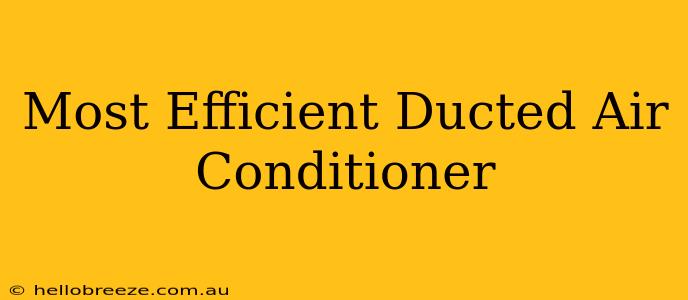Choosing the right ducted air conditioner can significantly impact your comfort and energy bills. This guide explores the features of the most efficient ducted air conditioners on the market, helping you make an informed decision for your home. We'll delve into key factors to consider, ensuring you find the perfect balance of cooling power and energy efficiency.
Understanding SEER Ratings: The Key to Efficiency
The Seasonal Energy Efficiency Ratio (SEER) is the most important metric when assessing the efficiency of a ducted air conditioner. A higher SEER rating indicates that the unit uses less energy to produce the same amount of cooling. While minimum SEER ratings vary by region and regulations, aiming for the highest SEER rating within your budget is crucial for long-term savings. Look for units with SEER ratings of 20 or higher for optimal efficiency.
Beyond SEER: Other Efficiency Factors
While SEER is paramount, other factors contribute to overall efficiency:
- EER (Energy Efficiency Ratio): This measures cooling efficiency under specific conditions and provides a useful supplement to the SEER rating.
- Variable-Speed Compressors: These compressors adjust their speed based on cooling demand, providing precise temperature control and significantly reducing energy consumption compared to single-speed models. They're a key feature of many high-efficiency units.
- Smart Features: Many modern ducted air conditioners include smart features like programmable thermostats, allowing for precise temperature control and automated energy-saving settings. These features can dramatically impact your energy usage.
- Insulation and Ductwork: Even the most efficient air conditioner will struggle if your ductwork is poorly insulated or leaky. Ensure your ductwork is properly sealed and insulated to minimize energy loss. Regular maintenance, including cleaning your air filters, is essential for maintaining efficiency.
Top Features of High-Efficiency Ducted Air Conditioners
The most efficient ducted air conditioners often incorporate advanced technology for superior performance:
- Inverter Technology: This technology allows for continuous operation at variable speeds, leading to more consistent temperatures and reduced energy consumption.
- Two-Stage Cooling: Some models offer two-stage cooling, allowing for more precise temperature regulation and reduced energy usage during periods of moderate cooling demand.
- Improved Refrigerant: The use of environmentally friendly refrigerants, like R32, is becoming increasingly common in high-efficiency units. These refrigerants have a lower global warming potential compared to older options.
Choosing the Right Size: Avoid Overcooling (and Overspending)
Proper sizing is crucial for efficiency. An oversized unit will cycle on and off frequently, leading to higher energy bills and uneven cooling. A qualified HVAC technician can perform a load calculation to determine the correct size for your home, taking into account factors like square footage, insulation, window efficiency, and climate.
Maintenance for Maximum Efficiency
Regular maintenance is essential for preserving the efficiency of your ducted air conditioner. This includes:
- Regular filter changes: Dirty filters restrict airflow and reduce efficiency.
- Annual inspections: A professional inspection can identify potential problems before they escalate, ensuring optimal performance and preventing costly repairs.
- Coil cleaning: Clean evaporator and condenser coils contribute significantly to better efficiency and longevity.
By carefully considering these factors, you can choose the most efficient ducted air conditioner for your home and enjoy cool comfort without breaking the bank. Remember, investing in energy efficiency is an investment in your future savings and environmental responsibility.

